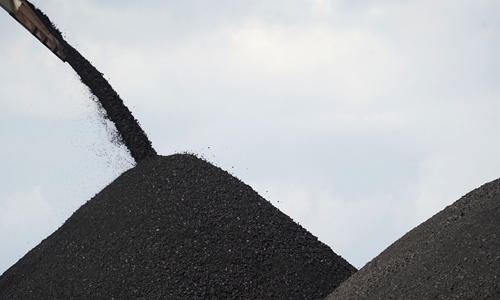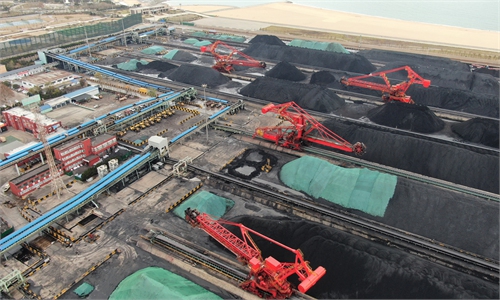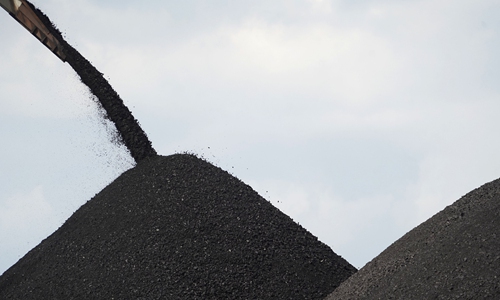China moves to stabilize commodity prices, supplies as global uncertainties rise
Measures aim to ensure coal, iron ore supplies amid global uncertainties

Coal Photo:CFP
China's top economic planner said on Thursday that it will further improve the market pricing mechanism for coal, following a series of measures to stabilize the prices of iron ore and other commodities that have huge weigh on China's economic operations, amid already-surging prices and growing international uncertainties.The National Development and Reform Commission (NDRC) issued a notice on further improving the coal market price formation mechanism, which clarified the reasonable range of coal prices and linked coal prices with coal-fired electricity prices.
The introduction of such a mechanism sent a clear signal to the industry and the market that China will further strengthen the regulation and supervision of coal market prices, according to the NDRC.
If coal prices remain within a reasonable range, electricity prices will be effectively transmitted through the market, Wan Jinsong, director of the Price Department at the NDRC, said at a press conference on Thursday.
"China's coal self-sufficiency rate exceeds 90 percent. Our own resources can fully meet domestic demand," Wan said.
According to the NDRC, the long-term transaction price of coal loaded on ships at Qinhuangdao Port, China's main coal port in North China's Hebei Province, should range from 570 yuan ($90.2) to 770 yuan per ton, including tax.
"Coal production and market supply are generally stable, with daily output of more than 12 million tons and coal storage in power plants at a historical high," Peng Shaozong, deputy director of the NDRC's Price Department, said during the press briefing.
Price mechanism reform does not involve electricity prices, which will still follow the market-based mechanism of base price plus fluctuation of no more than 20 percent.
"No matter how the coal price changes, the market price of coal-fired power generation cannot exceed the limit of a 20-percent increase, except for energy-intensive enterprises. This means electricity rates for households and agriculture will not change from the current level," said Peng.
Apart from coal, the NDRC also said on Wednesday that it will shorten the free storage period of iron ore at ports and increase the cost of port hoarding, in a bid to prevent excessive stockpiling.
This move comes after some recent abnormal situation where the supply and demand of the iron ore market were generally stable but prices surged.
The NDRC will also urge iron ore trading enterprises to release excessive iron ore inventory at ports.
Since January 28, in view of the recent iron ore price changes, the NDRC released six notices on iron ore in less than a month in order to stabilize iron ore prices.
"China's iron ore is more than 80 percent reliant on imports, mainly transported by sea. Stockpiling at ports creates the illusion of tight supply in the spot market, resulting in inflated prices that are unsupported by real demand," Hu Qimu, chief research fellow at the Sinosteel Economic Research Institute, told the Global Times on Thursday.
The recent notices and measures released by the NDRC said that it will regulate the market to stabilize commodity prices and ensure steady supply, Wang Guoqing, research director at Beijing Lange Steel Information Research Center, told the Global Times on Thursday.
"Coal prices may drop further after March 15, when most areas in northern China will end the heating season, resulting in less coal demand for heating," said Wang.
But Wang noted that the Russia-Ukraine tensions are pushing up international energy prices and related commodity prices. Higher coal and iron ore prices will put pressure on domestic downstream industries, such as power and steel.
According to public statistics, Russia's mineral resources account for 37 percent of the world, among which the reserves of iron ore, diamonds, antimony, tin and potash are the first in the world. Ukraine, the world's third-largest grain exporter, has more than 80 exploitable mines.
"If the conflict between Russia and Ukraine leads to the interruption of transportation, it will easily lead to an energy crisis and a food crisis, and the price of nonferrous metals such as tin and nickel would get out of control," said an industry insider.
For instance, the price of Tin futures at the Shanghai Futures Exchange is up 13.81 percent so far from the same period in 2021. Futures for nickel and other non-ferrous metals reached trading limit.
On February 15, China reached an agreement with Canadian Potash Exporters, setting the standard import cost and freight price of potash chloride in 2022 at $590 per ton.
Such a contract price is at a near five-year high, rising 139 percent year-on-year, media reported.



